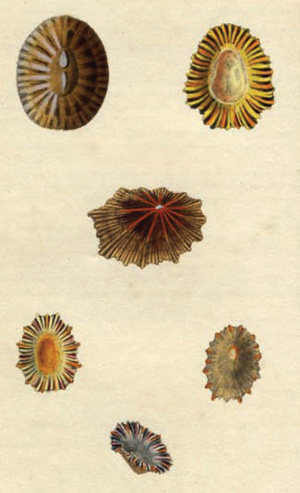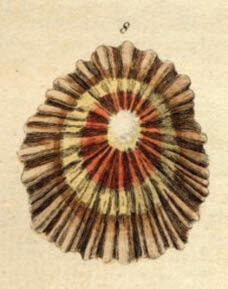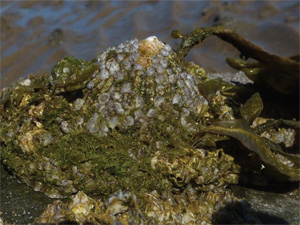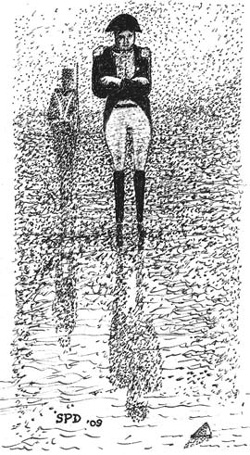|
Issue 21 of this magazine featured a poem by Peter Dance called “ The Limpet”. I was delighted to receive the following poems in response and Peter has also replied himself in verse and with a drawing, so I hope you will excuse the indulgence of some space in this issue to include them here. Editor Dear Peter, Well you asked for a reply to Peter Dance’s poem. I showed it to some of our local limpets on a Solway beach and found this reply scratched on a rock the next day:-
The Limpet’s ReplyI am a simple limpet, clinging firmly to my rock. But looking into “Mollusc World” I got an awful shock. P. Dance says I’m immobile, static, stationary, staid. I had to read it twice. I could not believe what he had said. He is wrong in what he stated My mobility he’s underrated. He must have watched when tide was out; When it is in, I glide about Fuelled by the algae I devour I travel at an inch an hour! At navigation I’m the best, I know the east; I know the west When tide is in I walk around When it goes out then I am found In the same spot from whence I started Just as though I’d ne’er departed. It’s done by skill, not just by chance. Could you do as well, S. Peter Dance? Transcribed from the rock by Jim Logan
Dear Sir, In response to Peter Dance’s rather cruel entry in Mollusc World, here is my response, Yours etc A. Patellidae (P.S. Sorry about “Gunnerside”, a bit of poetic licence) OK, I am a LimpetOK I am a limpet, with not very much ambition But it’s really so unfair to us to be accused of lack of mission Of being dull and lazy, of being a sucker in a shell When actually not all of us are content to say “Oh well” My good friend Pete’s aboard a ship and travels far and wide He’s sent us postcards from Hawaii (and even Gunnerside!) He may not get an outside cabin or dine at the Captains table But he says the hull’s quite cosy when he’s next to girlfriend Mabel And then of course there’s my old friend Alf Whose journeys are quite epic; He’s attached to a humpback whale And commutes twixt poles magnetic. Finally I come to Sid Who’s stuck on a piece of flotsam So if boredom’s what you want my friend He certainly has got some. I hope Mr Dance will view us anew After reading about my tribe And not dismiss us (who knows he might kiss us) Instead of a new diatribe. John Robinson
The Limpet’s response to S. Peter DanceWho has the time to stand and stare? If I were a limpet I would not dare because S. Peter Dance (if he had a chance) would soon make sure that I was not there. He’d take my life for nothing more than standing and staring on the shore. I suspect that Peter would like me fleeter of foot. Just wait till he’s 94. Then he will have to stay quite still, as limpets do and always will. Oh Peter, be careful. Do not mock; For then YOU’ll be sitting on a rock. Sarah Longrigg
Dear Mr Topley, ...it would be interesting to know the reason why [Peter Dance] hates limpets, & when his hatred started. Perhaps some thoughtless collector gave him a large number of limpets unlabelled, from all parts of the world. That would be a cruel request for anyone. I find Australian limpets hard to identify! But they make quite an attractive display collection! Being often subject to irresistible attacks of penning verses, I submit the following:-
Hidden BeautyThe Limpet is a mollusc shy You’ll see on rocks as you pass by. It does not feel the need to roam, Erodes a shallow patch for home. Exposed to air it clings on tight And shuns the heat of daily light, But when immersed, when tide grows high It lifts its shell to graze nearby. The outer shell is dark & dull Discouraging collectors cull. In shape some shells are tall or flat, Well suited to rough habitat. To see the animal inside it Quickly insert a knife beside it, The humble creature once ejected Shows nacreous beauty unexpected! But if the Limpet still you hate It makes a handy fishing bait! But the Limpet is a mollusc wise, It knows the danger of small size, It knows the dangers very well And never goes outside his shell! Thora Whitehead, Queensland, Australia
The Limpet – A RejoinderOh, I do like the limpet A much maligned wee beast Take a pot to the shore……. and fill it To make a humble feast. You don’t want small or big ones You need the medium size You scrub the shells, then place them On a buttered pan, that fries. A dash of white wine vinegar Will hone the fishy taste You heat the pan, the limpets cook Then eat them up with haste. And when your meal is over Cast the shells a second glance The inner nacreous surface Might appeal to S. P. Dance! Jan Light, 10th December 2009
Jan writes:- I first ate limpets a year ago when a Norman fisherman neighbour served them as a starter. The fun part is when the shells start leaping in the pan as they cook – this is the steam which gets trapped under the shell you understand! You simply bring the skillet to the table and guests serve themselves straight from the pan, armed with a pin, although the flesh comes away easily. LimpetsThe tide lifts, the tide lifts, the tide lifts. A tiny squelch: a body’s stretching forth. Clinks: shell on shell; trickles: the gathering sea. Reverberations from that other world The underledge, where seaweed thickly trails. A dogwhelk’s stalking: a strong foot that curves, Head quests, mouth gently feels, paired tentacles Droop forward over seeing broken crab. The smell and sound jar up my rock to me. Free in our upper world, our own clear patch, We limpets scarcely need at first to move. Our food’s our home – our seaweed as it’s sprouting. One sense of weed and rock and tongue and me. Soothing the rhythmic rasp of boney tongue And tongues around me working busily. I mark with juice each tiny particle Of rocky home – which forms me: my sheltering shell Exactly fits my roost; I nestle where A big old limpet held the patch that’s mine, And the next patch. An alongside fellow Spawned with my birth, twin gametes flung to ocean, Holds half the natural stronghold, half the slope. We’ve fed. We’ve taken all that this tide offers. He’s settled back. He’s had more weed than me. Relaxed, he munches at his shallow bedplace. I slowly edge, I creep behind, I wedge in silence My shell, I rock, I rock, I rock, I heave. Frightened he tightens. He’ll do the same to me now Another tide. We’ve grown to battle royally. “Earth takes all. Water makes all new.” So a Polish gardener once translated. I learned the second young, away from home, Amazed at the vast sea, its upshrugged bounty, Heap upon heap, fresh and fresh again. Then after delving as into autumn leaves I set myself to pick a very best, Biggest, tallest, prettiest, most distorted, At every tide bewilderment of choice. Some are lined up just as I arranged them When first I knew their names: flat winkles, dog whelks, Mussels, cockles. Limpets showing the underside And some the top. The common limpets were The most touched, so rough outside, so smooth within. Their sandy cornets match the nibbled wafers Of childhood holidays; inside, matching rainy days. I turn the shells with thoughts of later childhood, The lifelong puzzle why some shapes can please, And even simple limpets show this too: Humped shoulders clumsy, others seeming mad Of linked fans flatly spread, some almost rectangle With sides in golden section short to long. I think of teaching-time: when asked to rank shells Each child chose a different rationale, And each was valid; also, they loved to draw them, At first resisting white chalk on grey paper. But seeing as I saw the plainest shells Growing to strangest draws most like the model And most like each child too, together thought of. Time’s marked by rearrangement: books then led me On shore and in assembling of the trays. The Halcyon, the Blue-Rayed, the Kingfisher, That even now I can’t resist to gather; The Tortoiseshell, sometimes the northern prize Of shell sand; the finely fretted Keyhole, And like it, the dainty Slit-Margin limpet, Cross-coffered like a neoclassic ceiling; The smothering, chain-mating, alien Slipper - Now there’s one shell, one mollusc I don’t care for – Coarse, dirty-pink Crepidula fornicata; Chinaman’s Hat, as quirky as its name; Records of primitive chitons, odd, unsea-like; The limpet tray swelled in variety. The commonest molluscs all must be displayed The equal denizens of a collection, And commoner limpets subtly can divide: Vulgata, aspera, intermedia or depressa, Dog Latin chanted and with careful hand Set underneath them like a stalking whelk. Within, colouring that’s almost unattractive: Pale greys, pale greens, pale yellows, bluish white, Some shot through with orange, rusty red or rich slate blue. A colour scheme that’s off the edge of obvious Sets up a salty tingle in the taste - And Shifting occlusions show Brightest depths of cloudy daytime skies Or milkier skies without a hint of sun, Echoing the British days when they were gathered. From depths of layering springs clearest freshness Still gleaming after many years in trays. Rosalind Holt
“A poem to appease some poetical critics of ‘The Limpet’ - with apologies to J.M.W. Turner and Napoleon Bonaparte:-“ The Exile and the Rock LimpetExiled on a barren rock Napoleon Bonaparte would have had a dreadful shock had he seen a work of art Turner dashed off in his prime showing the tyrant gazing at a limpet spending time alone and quietly grazing. That tyrants may stand and stare is not a complete surprise but I should have been aware that limpets take exercise wandering this way and that when they are inundated making me feel rather flat and somewhat overrated. S. Peter Dance, Carlisle, |
Images (From Edward Donovan’s “British Shells”, 1804) (E.M. Da Costa, 1778)
The Exile |
Poetical responses to “The Limpet”
Issue
23
Page
18



 A large Patella vulgata heavily encrusted with weed and barnacles, North Wales (Photo: Peter Topley)
A large Patella vulgata heavily encrusted with weed and barnacles, North Wales (Photo: Peter Topley)